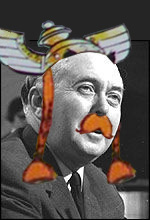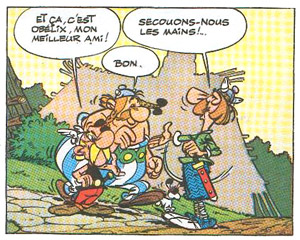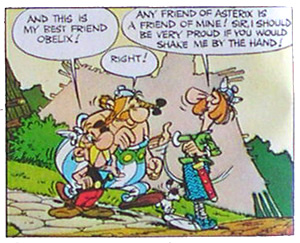ASTERIX IN BRITAIN / ASTERIX CHEZ LES BRETONS |
Pages N° 5 6
7 8 9 10 11 12 13 14 15 16 17 18 19
20 21 22 23 24 25 26 27 28 29 30 31 32 33 34 35 36 37 38 39 40 41 42 43
44 45 46 47 48 |
| puns & wordplays |
|
|
| cultural references |
| category |
Page, panel |
French version |
English version |
| Change |
Page5, p7 |
B' ' ' ' ' ' ' ' ' ! Elle est f 'oide! "Brrrrrrrrr!"
to express the feeling of the cold turns into "B' ' ' ' ' ' ' ' '".
The gag is on the form (how shall we read "' ' ' ' ' ' ' ' '"?),
but couldn't be translated. The french [r] is often misspronounced when
speaking with the african-french accent. It's not the case with the English
[r]. |
I'se c-c-c-c cold! The gag is still about pronouciation
but the question is no longer how to read it, but what do you hear. The
Black lookout is given the typical southern afroamerican accent (see Miss
Watson’s black slave Jim in Huckleberry Finn, by Mark Twain). "I'se
cold" echoes "Ice cold", refering again to the temperature
of the water. |
| Same (quote) |
Page5, p7 |
O fortunatos nimium, sua si bona norint ! Agricolas!
From: Virgile, Géorgiques, II,458-459. |
O fortunatos nimium, sua si bona norint ! Agricolas!
From: Virgile, Géorgiques, II,458-459. |
| Change |
Page6, p2 |
Ils parlaient la même langue que les Gaulois,
mais avaint une façon un peu spéciale de s'exprimer... (...)
Il est, n'est-il pas?... makes fun of the question tags which are translated
word for word and then doesn't mean anything in French. The straight translation
is used for gags through the entire story (literal translation of tags,
idioms, English grammar strucures...). See at: http://www.mage.fst.uha.fr/asterix/bretons/anglais.html |
They spoke the same language, but with some peculiar
expressions of their own... The whole problem for the translator with
this album is here. (...) I say, rather, old fruit! replaces the
question-tag gag which wouldn't have kept anything funny if it had been
translated straight (It is, isn't it?). The difference of speaking between
the Britons and the Gauls from Bretagne is kept. Instead of speaking the
straight translated English they speak in the French version the Brittons
will use a somewhat "oxfordian" English, rather formal, filled
with expressions such as "Old fruit, old chap, repetition of jolly
...". |
| Change |
Page6, p6 |
S'il vous plait, faites! The english expressions
are translated word for word here again. |
Righty-ho, luv (...) Marmalade's off! This
translation marks a change with the formal English spoken by the Britons.
But only the waitresses and later the thief use this casual English. |
| Loss |
Page6, p6 |
Puis-je avoir de la marmelade pour les roties?
Goscinny makes a pun with the use of "roties" (translation of
"peace of toast"). This can be seen as a double gag. "Toast"
becomes "roties" ( [roti] which can be understood as "piece
of toast", but also as "roast"), and if so, this is the first
cutting remark to the English cooking (marmalade with roast?). |
|
| Same |
Page6, p9 |
Toute? Non! Car un village résiste encore
à l'envahisseur. Repeats the introduction of all the Asterix
stories but applies it to another village. |
All? No... One village still holds out against the
invaders. Idem |
| Change (name) (caricature) |
Page7, p1 |
Is Zebigbos Winston Churchill's caricature,
or Harold Winlson's? For the French reader, nowadays, no doubt Churchill's
name rings more a bell than Wilson. |
But Mykingdomforanos is the defender of a small
humble village where people don't always speak the Oxfordian English (the
waitresses page 2), fighting against the Roman imperialism. That role suits
better to a Labor Party prime minister like Harold Wilson, who was indeed
Prime Minister from 1964 to 1970 and from 1974 to 1976. The French version
of Asterix chez les Bretons was released in 1966, and the English version
came in 1970. Plus we may recognize Uderzo's caricature closer to Wilson's
face than to Churchill's. |
 |
 Winston
Churchill? Winston
Churchill? |
 Harold
Wilson? Harold
Wilson? |
| Change (name) |
Page7, p2 |
O'Torinolaringologix, Mac Anotérapix,
Jolitorax |
O'Veryoptimistix, McAnix, Anticlimax |
| New (accent) |
Page7, p2 |
|
Caledonian accent could'nt be conveyed in French but
the translator couldn't leave it out so where the French version just makes
fun of the typical names from Ireland and Scotland, the Enghish translation
also contains a reference to the very specific Scottish accent. |
| Loss |
Page7, p4; Page7, p5 |
(...) c'est grace à une potion magique
qui leur donne une force surhumaine. The constant
English grammatical construction with the the adjective before the noun
is not true here. Neverthless, the scene with Obelix trying to understand
English grammatical constructions has not been read yet, (p9). We may consider
that the characters are speaking between themselves (no non-British character
in this scene, considering the Hibernians and the Caledonians as beeing
British, see P7 p2) and therefore that their words are translated in a correct
French though some idioms are still translated straight. |
|
| Change |
Page7, p7 |
Bonne chance, et toute cette sorte de choses...
Literal translation of idiom, retranscribed in its original form in the
English version. |
Jolly good luck, old boy, and all that sort of things...
A good example of the translator's strategy. The idiom used here ("...and
al that sort of things") is kept in English in its original form, so
in the English version, the funny thing is not here. It is in the addition
of "jolly" and "old boy" we explained earlier. |
| Change? |
Page7, p9 |
Frêle esquif. This combo appears many
times in the album. |
Jolly-boat is indeed the faithful translation
of "frêle esquif". The choice of "jolly-boat"
by the translators surely was motivated by "jolly" which echoes
the recurrence of the word in the Britons' speech bubbles. |
| Same |
Page 7, p10 |
La tribu des Cambridges refers to the Oxford
- Cambridge boat race. |
The tribes of the Oxbridgienses. "Cambridges"
becomes "Oxbridgienses" (Oxford + Cambridge) for a better allusion
to the race between the two universities. The average French reader would
be more familiar with "Cambridge" or "Oxford" than with
"Oxbridge". That's a way to avoid bias towards one of the two.
What would the Oxfordian-fan reader think if there was only Cambridge was
cited? |
| Loss |
Page8, p5 |
Je dis. Ca c'est un morceau de chance! Je suis Jolitorax!
Secouons-nous les mains! Literal translation again, even the plural
is kept for "hands". The French equivalent use a singular form:
"secouons-nous la main". |
Oh, I say, what a bit of luck! I'm Anticlimax. Let's
shake hands, old boy. Another example of the difficulty for the translators
to convey the original humour. Except the "I say" and the "old
boy", the speech in English doesn't have anything funny. |
| Change (drawings) |
Page8, p7 |
Uderzo usually draws quite wide speech bubbles so he
can be sure the text will fit in, and it gives a better quality for reading.
Here, Jolitorax' speech bubble has the average space between the text and
the border. |
But the bubble has been resized for the translation.
What made the translators change the graphical aspect of the panel?
-In the 5th panel, we saw that the translation for "secouons-nous
les mains" was kept as the original -and not funny- "let's shake
hands". The translators had the possibility to repeat the process
with the "secouons-nous les mains" of the 7th panel. On one
hand it would fit into the speech bubble, but on the other, this would
not have been faithful with the original gag, and it would have been lost
in the translation (we saw it happens sometimes).
-Anticlimax could have just said "Shake!" to Obelix, but it
wouldn't have fitted with the distinguished tone of his speaking.
-In this particular case, Anticlimax' speech had to keep the original
gag with the "shaking" idea because of the following panel where
Obelix literally shakes the foreigner like a carton of orange juice. He
doesn't only "shake the hands" like Asterix and Anticlimax do
in panel 6.
-To make the Briton say something Obelix understands the "right"
way (so that panel 8 hits the gag), Bell & Hockridge used the expression
"shake me by the hand", which suited very well for the situation.
-"Shake me by the hand" used alone would break the formal usual
speaking of Asterix's cousin (as for "Shake!"). Therefore the
translators had to find a way to soften the sentence qnd keep the very
polite tone of the character. They added: "Any friend of
Asterix is a friend of mine! Sir, I should be very proud if you would
shake e by the hand!" Hence the gag in the 8th panel can
be understood: Obelix understands everything to the letter and has on
idea of his strength. He literally shake Anticlimax by the hand.
-the French version makes fun of the English idiom "let's shake
hands" by translating it literally. "Secouer" for "shake"
allows the gag in the 8th panel, where the right French expression "serrer
la main" (grip the hand) couldn't lead to the same situation, while
the English translation also makes fun of an expression (shake me by the
hand) by showing the two very different ways to understand it. |
| |
|
 |
 |
| Change |
Page8, p6&9 |
Mais c'est ce Germain qui m'a dit... Obelix
doesn't know the meaning of "cousin germain" (first cousin). He
thinks Jolitorax is Asterix's Germanic cousin ("germain" = germanic).
It' just one of the many times Obelix shows his limits when dealing with
culture. |
In panel 6, Asterix welcomes Anticlimax and says
"Anticlimax! My first cousin once removed!" It may appear "overtraduced":
first cousin is the equivalent for "cousin germain". The problem
is that Obelix's mistake can't be kept in the tranlation if Asterix says
just "Anticlimax, my first cousin!". The expression "first
cousin once removed" had two assets. It keeps the original kinship
between Asterix and his Briton fellow. The speech bubble its wide enough
to contain a third line. In fact, the original speech bubble almost seems
like it has a line missing. The other quality is the possibility it gives
to the translators to find an equivalent gag for Obelix's unculturedness.
In the English version, he understands "once removed" as "has
een re-moved yet". No need to say that Obelix notion of moving something
is quite different from not-fallen-in-the-magic-potion people... Obelix
explains in panel 9 "he's been removed once anyway, and he asked
me to...": Anticlimax surely knew what it was to be "re-moved"
by beeing shaked by the hand as he has already been removed once! We may
hesitate in front of asterix's reaction: angry because of the violence,
ashamed by his "best friend"'s stupidity before his cousin,
or both. The only difference between the two versions of the scene is
that the original opposition between "Germain" and "Breton"
is lost. |
| |
|
|
|
| |
|
|
|
| |
|
|
|
| |
|
|
|
| |
|
|
|
| |
|
|
|

 Winston
Churchill?
Winston
Churchill?  Harold
Wilson?
Harold
Wilson? 
